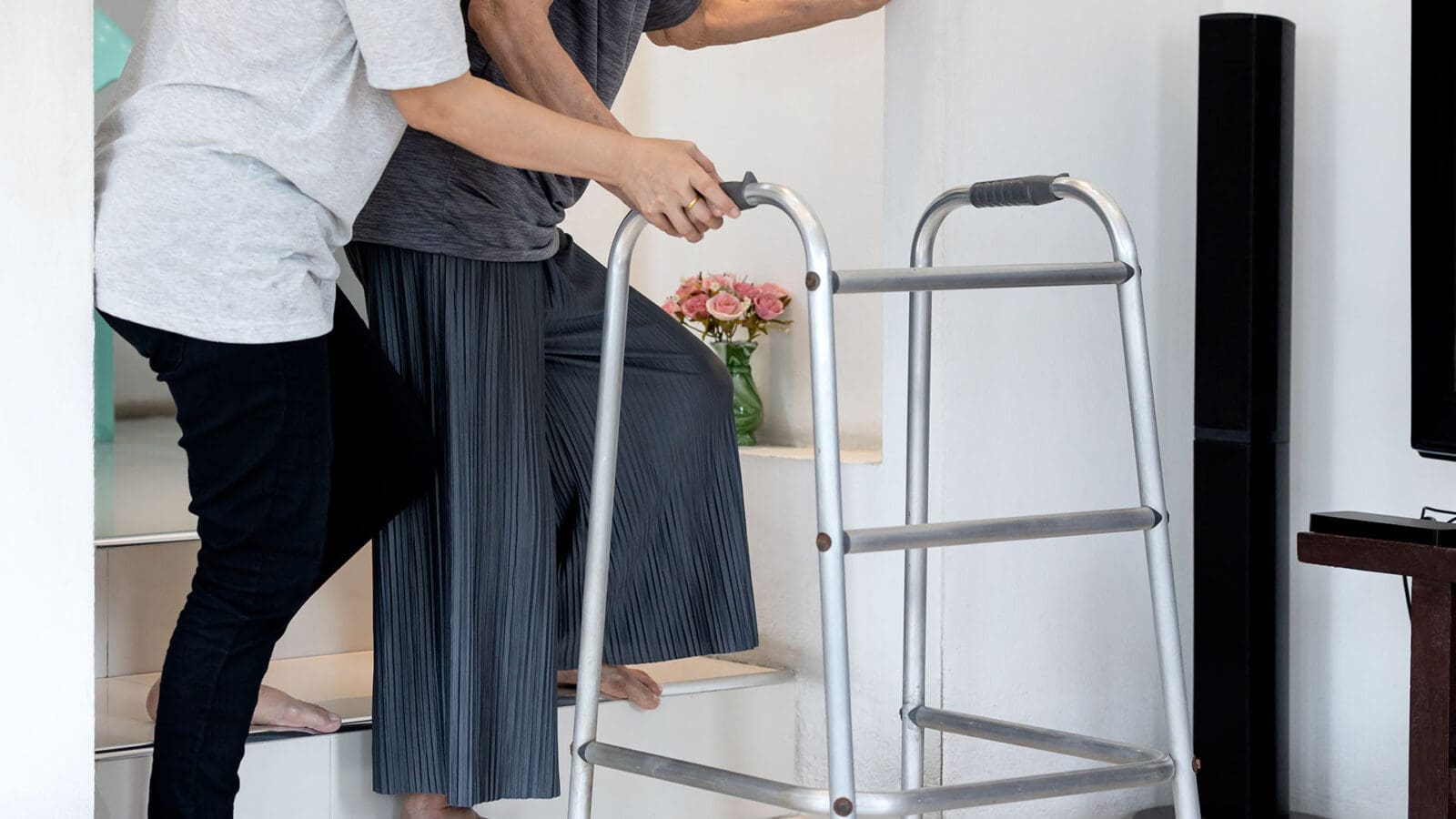
VA Aid and Attendance Benefits | VetLaw
How to Apply for VA Aid and Attendance Benefits
Perhaps you are already receiving monthly payments from the VA for your service-connected disability, or maybe you are just beginning to research into what benefits are available to you. If you struggle with certain daily tasks and need the assistance of your spouse or a caretaker, you may qualify for additional compensation through the VA. Disabled veterans who require help with their basic needs may qualify for special monthly compensation for aid and attendance.
If you get overwhelmed just by looking at the VA’s website, you’re not alone. Many veterans struggle with the VA disability benefits application process. It seems like the regulations are always changing, so how do you know which form to fill out? Not to mention, one typo or missing piece of paperwork can result in a VA disability claim denial.
Nonetheless, it’s important that you don’t miss out on this additional benefit if you are eligible. Read on to learn more about special monthly compensation, aid and attendance, and housebound benefits as well as how to find out if you qualify.
WHAT IS SPECIAL MONTHLY COMPENSATION (SMC)?
The VA pays out special monthly compensation (SMC) to veterans who have certain disabilities or needs. Your SMC monthly benefit is based on the type of disability or needs that you have and your family size.
Examples of qualifying disabilities include:
- You are unable to leave the house because of your disability
- You sustained blindness or the physical loss of one or both eyes
- You’ve had a limb amputated, or you’ve lost the use of a limb
- You require aid and attendance
- You are bedridden
WHAT IS AN AID AND ATTENDANCE (A&A) ALLOWANCE?
VA aid and attendance (A&A) benefits compensate you for needing help with daily activities such as getting dressed in the morning, showering or bathing, and eating. These benefits are added to your VA monthly pension.
If you cannot leave your home due to your disability, you may qualify for a housebound allowance. It’s important to note that there is a single application for special monthly compensation which covers both aid and attendance as well as housebound status, but you cannot receive both benefits at the same time. Perhaps confusingly, the benefit for aid and attendance is a higher monthly amount than the benefit for housebound status.
WHO CAN RECEIVE SPECIAL MONTHLY COMPENSATION FOR AID AND ATTENDANCE?
Veterans who receive special monthly compensation for aid and attendance must meet certain eligibility requirements. You may qualify for this benefit if the following is true:
- You receive VA compensation or pension; and
- You need assistance with daily activities; or
- You are bedbound; or
- You reside in a nursing home because of your disability; or
- You have extremely limited eyesight; or
- You have lost one or more limbs through amputation or atrophy (known as loss of use); or
- You suffer from a severe traumatic brain injury (TBI) and need skilled in-home care
As noted above, VA will consider both aid and attendance and housebound status if you are bedbound, but you cannot receive both benefits at the same time.
Eligibility requirements for VA disability benefits can change at any time. If you received a disability claim denial or a special monthly compensation claim denial in the past, contact our office. The regulations may have changed, and we can help you with your appeal.
What Can VA Aid and Attendance Money Be Used For?
The VA awards aid and attendance as a cash benefit to handle the expenses associated with caring for eligible veterans or their surviving spouses. Many families use VA aid and attendance money to handle the following expenses:
- Home care assistance. Aid and attendance money is commonly used to pay in-home caregivers to provide veterans with assistance in performing everyday activities like eating, bathing, and dressing.
- Assisted living facilities. Assisted living facilities provide personalized care to veterans in residential living. These facilities offer a safe and comfortable environment to help veterans complete daily routine tasks.
- Nursing home expenses. For veterans who require around the clock nursing care, aid and attendance money may be used for the costs of living in a nursing facility.
- Medical costs. Expenses related to prescription medications, medical devices and equipment, and transport to doctor’s appointments can quickly add up. These benefits can relieve the financial burden of medical costs.
- Home improvements and modifications. Many veterans and their families need to install wheelchair ramps, grab bars, or make other modifications to make their home more accessible. VA aid and attendance benefits can be leveraged to make these oftentimes costly home modifications.
- Other related expenses. Ultimately, these benefits can be utilized to cover any and all expenses associated with the care of the disabled veteran or their surviving spouse, including home cleaning services, meal delivery, and/or respite care.
How to Get Aid and Attendance Approval
To apply for VA aid and attendance benefits you and your attorney will complete the VA Form 21-2680 and file it with the Pension Management Center that serves your region. A doctor, physician assistant, or advanced practice registered nurse must complete an examination and detail the findings in your application. Their report will reflect your ability to move around and complete daily activities, as the VA will look at this information to determine whether you are housebound and require regular care.
To get aid and attendance approval, ensure that your application is properly completed and that all relevant evidence is included. While daily assistance should be available for veterans and their families, the process of getting approval for aid and attendance benefits is time-consuming and difficult. Your attorney will work with you to navigate the red tape of the VA aid and attendance process and ensure that you assemble the strongest application possible.
How to Handle an Aid and Attendance Benefits Denial
After dedicating so much time and effort to crafting the strongest application possible, being denied aid and attendance benefits can be incredibly discouraging. Unfortunately, denials are common, largely due to seemingly innocent mistakes during the application process. The slightest mistake will disqualify a claimant, underscoring the importance of paying great attention to all the small details of your paperwork and evidence.
After being denied VA aid and attendance, you have a few options at your disposal to continue your case. Depending on the circumstances of your denial, supplementing your claim with additional information may be the right course of action, meaning that filing a Supplemental Claim is the right choice. Alternatively, you and your attorney may file a request for higher-level review or file an appeal to the Board of Veterans Appeals if a mistake was made during the decision-making process or if it would be beneficial for a veterans law judge to review the denial of aid and attendance benefits.
While filing an appeal can be intimidating, our VA appeals attorneys have years of experience navigating this process and achieving a favorable outcome for veterans across the country.
How to Get Aid And Attendance Approval After a Denial
Veterans are entitled to aid and attendance benefits for valiantly serving their country. If you were wrongfully denied benefits, it is important to understand that you have the right to appeal the denial. Filing an appeal to have your claim reviewed by a Veterans Law Judge can be the most effective option, but it is also the most time-consuming.
At VetLaw, our team has helped countless veterans, spouses, and their families navigate the VA benefits process. If you are stuck in the cycle of appealing an aid and attendance denial, seeking legal assistance can make all the difference in getting through the process without unnecessary delays. Our appeals will review and strengthen your claim, then handle your appeal through all stages of the process.
FREQUENTLY ASKED QUESTIONS
Is special monthly compensation for aid and attendance considered taxable income?
According to the VA, special monthly compensation is a tax-free benefit. This compensation should not be included in your taxable income.
How do you apply for special monthly compensation for aid and attendance?
In order to apply for special monthly compensation for aid and attendance allowance or housebound benefits, you will need to complete VA Form 21-2680. If you are in a nursing home, you will also need to complete VA Form 21-0779. You will then need to mail these forms to your state’s pension management center (PMC) or bring them in person to your regional VA office.
If you have already applied for aid and attendance or housebound allowance and received a denial, our VA disability lawyers can assist you with your appeal.
Can a veteran receive both special monthly compensation benefits and SSDI?
Yes. It’s possible to qualify for special monthly compensation benefits and Social Security Disability Insurance. The VA administers special monthly compensation, while the Social Security Administration handles SSDI. Each benefit requires a separate application.
Veterans should be aware that each program has its own eligibility requirements. You may qualify for certain VA benefits but not SSDI, and vice versa.
LEARN HOW A VA DISABILITY LAWYER CAN HELP
We are a veteran-owned law firm, and our mission is to ensure that our fellow veterans receive the compensation they’ve earned. We believe that money shouldn’t stand in the way of a veteran pursuing benefits, so we offer free case reviews.
While the decision to grant benefits lies solely with the VA, we work hard to increase your chances of approval by:
- Knowing exactly what the VA looks for when establishing a special monthly compensation for aid and attendance claim
- Helping you gather important information that strengthens your claim
- Keeping track of important deadlines if the VA needs more information from you
- Educating you about ways to maximize your VA disability benefits
- Assisting you with a disability claim appeal if the VA denies your initial application
Contact us today to schedule your free case review.



